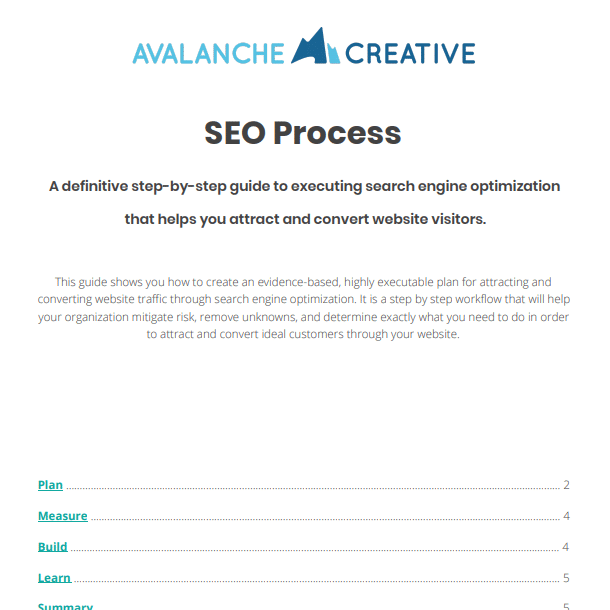The Right CMS for SEO Success
Building your site on the right CMS can make or break your SEO performance. Find the best CMS platform for SEO and what to look for when searching for one!

Category: Web Design, WordPress | Tags: SEO, Web Design, wordpress
What Is a CMS?
CMS stands for content management system, which is software that enables people to build and maintain websites without having to learn to code. WordPress, Squarespace, and Wix are a few you’ve probably heard of.
Content management systems have revolutionized the practice of website building. It is now an accessible field that doesn’t require years of learning computer languages like HTML or JavaScript. To build a website, you just need to understand the rules of design, site mapping, web security, and content creation. But which is the best CMS for SEO? Let’s compare CMS platforms and find out.
How a CMS Can Make or Break Your SEO
Some SEO-friendly CMS platforms have built-in features or plugins that users can add to optimize their content. On these platforms, you can optimize your metadata, add image alt text, and even optimize page load time. These customizable page elements are crucial in the SEO process.
A CMS platform without these features will put you at a disadvantage. While they may be cheaper, your website will likely not rank very highly for any of your targeted keywords, and your site will receive less traffic—and therefore less business.
CMS SEO Requirements that Help Boost Rankings
There are some necessary features that any quality CMS for SEO should have. These elements will help you make the most of your SEO strategy and give you the tools to create pages that rank highly on Google.
Must-Have On-Page SEO Features
1. Customizable Metadata
If you cannot customize the meta title, meta description, or alt text, your SEO value will be lacking, and your pages may not rank as well as they potentially could. Search engines have specific criteria for metadata. Descriptions, for instance, should not be more than 160 characters. A quality CMS platform will guide users through these specifications.
2. Internal Linking
Internal linking is a way to get users to spend more time on your website. Search engine algorithms love internal linking. It shows that you’ve built a portfolio of reputable, quality content. Any decent CMS will allow you to hyperlink text through its text editor.
Internal links can either link directly to a new page or open in a new tab, but external links should always open in a new tab. Directing a user from your page to another minimizes their total time spent on your page, and search engines will find your page less favorable. A great CMS for SEO should allow users to dictate what links open in a new tab.
3. Custom Site Navigation
A navigation menu needs to make sense to those who visit the site. They need to know how to find what they are looking for and fast, or they will leave, causing your website’s bounce rate, or the rate at which people exit, to go up. Search engines need to be able to “crawl” and index a site’s navigation menu. Creating a custom site navigation that is neat, easy to follow, and rich in keywords will result in positive SEO results.
4. Analytics/Tracking
Users want to see how well their pages are performing. The best content management systems for SEO have analytic tools that show the owner of a website how many clicks their pages and posts are getting, and track daily, weekly, and monthly trends.
5. Content Authoring
A content authoring tool will allow you to create interactive digital training content, which can be arranged in a chronological order, much like a class. This is an excellent feature when building a site with online learning solutions. Search engines favor pages with videos, so the ability to implement them in any sort of training is beneficial.
6. Taxonomy/Categorization Features
Taxonomy consists of categories and tags. These not only make sense to search engines, but also help users find related content and spend more time on your website. Blogs categorized in the same topic category may answer questions the reader didn’t find on the original post or page. The best CMS platforms for SEO will have a tagging and categorizing feature.
Must-Have Technical SEO Features:
1. Custom URL Structure
The ability to customize your URL is important. A slug, or part of the URL which identifies a specific page, should contain keywords without being too lengthy. Filler words such as “an” and “for” are better left out of the slug. A randomly generated URL with a bunch of numbers at the end is not only an eyesore, but also bad for SEO.
2. Mobile Optimization
60% of all people that visit a website are doing so on a mobile device. Mobile optimization is no longer optional. The layout of a page may be too overwhelming for a mobile view and need to be redesigned. The best CMS for SEO will have features that allow you to easily preview the site from a mobile view and make edits to that view only. Drag-and-drop design plugins make this process simple.
3. Page Speed Performance
There’s a reason loading speed is so important. If a page takes more than three to five seconds to load, the majority of users state that they will lose interest and leave the site. A slow loading period will result in a high bounce rate, and search engines will mark your site as poor quality, lowering your rankings.
4. XML Sitemap & Robots.txt File
A sitemap will give you an overview of your website’s navigation. This allows you to control which pages are the most relevant to your site and which pages fall under which category. The most prominent pages are likely to get more traffic, so these should be optimized and contain quality content.
A robots.txt file needs to be edited in accordance with the robots exclusion standard protocol. This is the process of robots “crawling” your site and scanning the images. Name files appropriately, and add alt text.
5. SSL/TSL Certification
SSL and TSL certifications are security measures applied to a website that reduces the likelihood of hacking and security breaches. If your website doesn’t have security, all the work you’ve done on improving SEO could have been in vain. Search engines prefer secure sites. They want to direct users to pages that they know won’t be infiltrated with bots and viruses.
6. 301 Redirect Capabilities
When a user lands on a page that no longer exists, it’s good to give them an alternative. Redirecting them to an updated or similar page instead of sending them to a 404 error page makes them less likely to leave your website.
Our Top 7 CMS Platforms for SEO
1. WordPress
WordPress is the most popular and well-known CMS platform currently available and is responsible for the creation of 40% of all websites in existence. Their SEO tools like Yoast and responsive themes are hard to compete with in terms of quality. Users can easily duplicate content, customize forms, and edit metadata. Their endless selection of plugins makes SEO customization a breeze, with options like Elementor and Divi that are based on visual, real-time editing processes.
2. HubSpot
HubSpot is a great CMS for SEO strategists who are new to the game. Its platform is intuitive to users and has tips for optimizing content to rank higher. It also offers features like Marketing Hub and Sales Hub that can be integrated. A sitemap is automatically created for users, and they offer a variety of themes.
3. Shopify
For those looking for an e-commerce platform, Shopify is the usual go-to. However, it isn’t solely for e-commerce sites. There’s a lot more it has to offer. Shopify is easy to use and enables the editing of metadata and image files. It is simple but doesn’t offer as much customization as other CMS platforms. Shopify does have essential SEO tools that allow users to target keywords and rearrange their site structure, so it’s a decently SEO-friendly CMS.
4. Squarespace
Squarespace allows businesses to create their own website from scratch. It handles many SEO tasks automatically and lets you research keywords, so for those who don’t have an external SEO research tool like Semrush, it’s a fantastic CMS. It has automatic sitemaps, content tagging, and an optimized URL for each page. This is an ideal choice for those new to SEO.
5. Wix
Wix is another start-from-scratch website builder that comes with a variety of SEO tools. It offers quick page loading, mobile optimization, and optional advanced SEO features. Its software is great at recognizing what will make a website rank and does a lot of the SEO work for the user. Its drag-and-drop editor makes design easy for beginners.
6. Joomla
Joomla is the second most popular CMS for SEO. It has templates, content management tools, metadata editing, and installable plugins to further customize your site. The plugins enable you to create an XML sitemap, redirects, and more. It isn’t quite as easy to use as WordPress, so it’s best when used by those who are more advanced in their SEO and site-building experience.
7. GoDaddy Website Builder
GoDaddy’s SEO wizard tool can suggest keywords and automatically optimize metadata to rank for those keywords. This CMS platform is ideal for those with moderate knowledge of SEO. It gives a bit of guidance but also requires some decent skills in optimization.
Why WordPress Is the Best CMS for SEO
WordPress has essentially all the tools you need to effectively implement your SEO strategy. Though the number of plugins can be intimidating for new users, the endless possibilities of what you can create with WordPress combined with the supreme SEO capabilities of the platform is why WordPress is the best CMS for SEO. We use WordPress to build nearly all of our websites and have been very successful in creating high-ranking content for our clients.
Using the Best CMS for SEO-Driven Web Design
Want to see the magic we can create with the tools WordPress offers? Let us create a customized website for you that is optimized for SEO. Get in touch with us, and we’ll have a chat about what your goals are for a new website and how we believe SEO can help your business.
Share this article:
The Avalanche Email: Fun. Simple. Educational. No Selling.
Learn Result-focused SEO & Content
Join over 2,272+ others who get one email every Wednesday with simple instructions on how to get more website traffic and leads through SEO and content marketing. (Learn more about the email)
Share this article:





